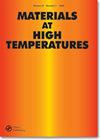Steel grades 91 and 92 microstructure and precipitate evolution atlas and life assessment tool
IF 0.9
4区 材料科学
Q4 MATERIALS SCIENCE, MULTIDISCIPLINARY
引用次数: 0
Abstract
ABSTRACTP91 and P92 steels are widely used in power plants and petrochemical industry for long-term service components. Due to high resistance to creep, fatigue and corrosion, the use of grade 91 and grade 92 steels allows ultrasupercritical conditions (600 °C, 300 bar). To achieve this goal the alloy design was based on the following metallurgical concepts: stable tempered martensitic microstructure, precipitation strengthening through M23C6 (Cr, Fe, Mo or W carbides) and fine MX (V, Nb carbides), solution hardening through elements as Mo or Mo/W and high Cr content. This study is focused on the microstructure evolution of grade 91 and grade 92 steels under aging and creep conditions. Three sets of laboratory-aged specimens heated in oven at 550°C, 600°C and 650°C were examined. Furthermore, the influence of stress on the microstructure was evaluated. The microstructures were characterized by several means of investigations and the results were compared to literature.KEYWORDS: MXM23C6Laves phaseZ phasecreep cavityinclusions Disclosure statementNo potential conflict of interest was reported by the authors.91和92号钢的显微组织和析出物演变图谱和寿命评估工具
摘要p91和P92钢广泛用于电厂和石化行业的长期服务部件。由于具有较高的抗蠕变、抗疲劳和抗腐蚀性能,使用91级和92级钢可以在超超临界条件下(600°C, 300 bar)使用。为了实现这一目标,合金设计基于以下冶金理念:稳定的回火马氏体组织,通过M23C6 (Cr、Fe、Mo或W碳化物)和细小的MX (V、Nb碳化物)进行沉淀强化,通过Mo或Mo/W元素和高Cr含量进行固溶硬化。研究了91级和92级钢在时效和蠕变条件下的组织演变。分别在550°C、600°C和650°C的烤箱中加热三组实验室老化试样。进一步评价了应力对微观组织的影响。通过多种研究手段对其微观结构进行了表征,并与文献进行了比较。关键词:MXM23C6Laves phase ez phase蠕形空洞内含物披露声明作者未报告潜在利益冲突。
本文章由计算机程序翻译,如有差异,请以英文原文为准。
求助全文
约1分钟内获得全文
求助全文
来源期刊

Materials at High Temperatures
工程技术-材料科学:综合
CiteScore
1.90
自引率
15.40%
发文量
58
审稿时长
>12 weeks
期刊介绍:
Materials at High Temperatures welcomes contributions relating to high temperature applications in the energy generation, aerospace, chemical and process industries. The effects of high temperatures and extreme environments on the corrosion and oxidation, fatigue, creep, strength and wear of metallic alloys, ceramics, intermetallics, and refractory and composite materials relative to these industries are covered.
Papers on the modelling of behaviour and life prediction are also welcome, provided these are validated by experimental data and explicitly linked to actual or potential applications. Contributions addressing the needs of designers and engineers (e.g. standards and codes of practice) relative to the areas of interest of this journal also fall within the scope. The term ''high temperatures'' refers to the subsequent temperatures of application and not, for example, to those of processing itself.
Materials at High Temperatures publishes regular thematic issues on topics of current interest. Proposals for issues are welcomed; please contact one of the Editors with details.
 求助内容:
求助内容: 应助结果提醒方式:
应助结果提醒方式:


